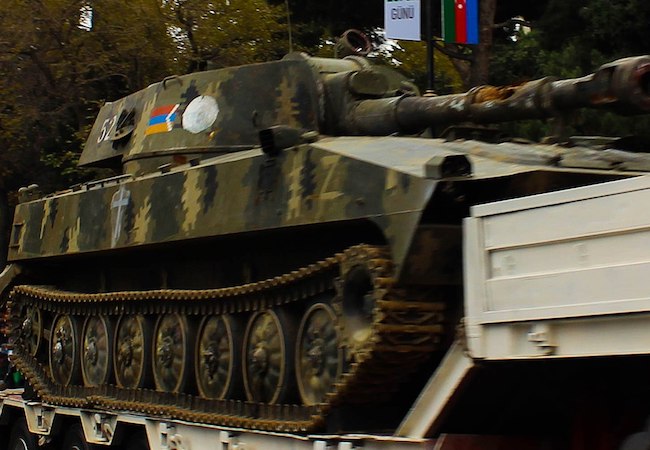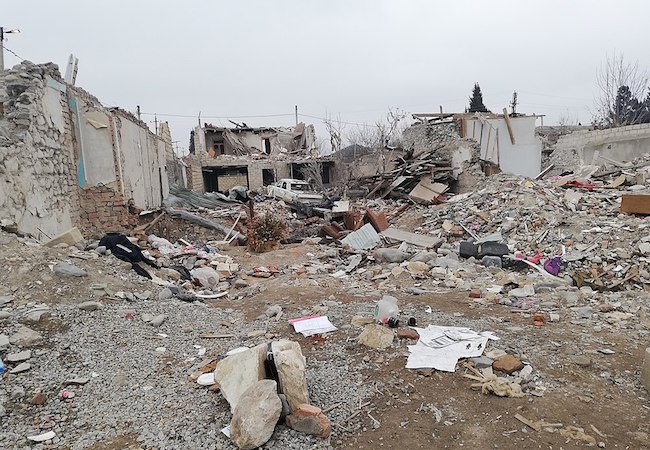Security challenges in the post-war period of the Armenia – Azerbaijan relations

By Vasif Huseynov
Despite the internationally mediated negotiations for up to three decades, Armenia and Azerbaijan failed to resolve the territorial conflict over the Nagorno-Karabakh region and surrounding districts of Azerbaijan through peaceful ways. The abuse of the peace process by the Armenian leaders to consolidate their control over the occupied territories and the failure of the international mediation protracted the conflict to the disadvantage of the regional peace and security.
This, against the backdrop of consistent provocations by the Armenian side, led to the breakout of the Second Karabakh War (aka the 44-day war) on September 27, 2020, which costed thousands of lives on both sides, although it put an end to the occupation of Azerbaijani lands and as such to the Armenia – Azerbaijan territorial conflict. The trilateral statement signed by the leaders of Armenia, Azerbaijan and Russia on November 10, 2020 established ceasefire between the two warring countries and offered a unique chance for the establishment of durable peace in the region.
Azerbaijan, officially declaring the conflict as “resolved”, calls for the seizure of this opportunity by promoting reconciliation process and opening of regional transportation and communication channels. There have been similar, even though not as much and as consistent, calls from the Armenian government. Nonetheless, the brief overview of the existing situation in the Karabakh region and between Armenia and Azerbaijan demonstrates that there are still some security challenges which need to be tackled with in order to avert future developments undermining peace initiatives.
President Ilham Aliyev of Azerbaijan, in his four-hour long press conference with the participation of representatives of local and foreign media in Baku on February 26, 2021, discussed these challenges at length and presented his vision about the future peace process. This conference and a general assessment of the recent developments indeed point to several risks and challenges for peace and security in the region.
Revanchism is a threat
The 44-day war between Armenia and Azerbaijan concluded with the restoration of Azerbaijan’s control over most of the territories it lost in the early 1990s. These territories that included former Nagorno-Karabakh region and seven surrounding districts have a clear legal status: they are internationally recognized as part of Azerbaijan. Thus, Azerbaijan regained what it owns legally. It did not incur into the territories of any other state.
This was the very reason why most of the countries across the world either supported Azerbaijan’s policies to liberate its occupied territories or maintained neutrality. Tellingly, even Iran and Russia, the two countries which have traditionally strong relations with Armenia, made unequivocal declarations during and after the war recognizing the region as part of Azerbaijan and, in the case of Iran, congratulating the Azerbaijani leadership for the victory.
This is not only a recognition of Azerbaijan’s territorial integrity by the international community but also should serve as a wake-up call to the Armenian nationalists and political forces. The irredentist and expansive policies have no place in the twenty-first century. The attempts to revive the conflict and re-establish illegal control of Armenia over the Karabakh region would not only pose drastic challenges to regional peace but also prevent the reconciliation between the two nations risking for new humanitarian tragedies and bloodshed.

Denial of the post-war realities is a call for future escalations
Neither the Armenian government nor Armenia’s political opposition has so far challenged the trilateral statement. The major articles of the statement concerning the handover of the three districts (i.e., Agdam, Kalbajar and Lachin) and the exchange of prisoners of war have been duly implemented. In line with the 9th article of the statement, the sides are currently focused on the opening of regional transport links which will allow unhindered movement of citizens, vehicles and goods in the region. President Aliyev, responding to a question about the possibility of the rejection of this document by Armenia in the future, reiterated the warning of Russian President Vladimir Putin who stated that this would be a suicide for Armenia.
There are, however, moves by the Armenian government that undermine the peace process and plant seeds for future escalations. The illegal visits of the Armenian officials to the Karabakh region through the Lachin corridor without the consent of the Azerbaijani government, the illegal and disguised dispatch of Armenia’s military servicemen to this region and the sabotage operations by them have caused tensions between Yerevan and Baku. These acts have been committed in total disregard to the principles of the trilateral statement.
The protests in Yerevan by the parents of the servicemen who are being sent to Karabakh and their demand to end this practice reaffirmed the facts that Armenia takes advantage of the communication opportunity provided by Azerbaijan through Lachin corridor and uses this also for military purposes breaching the trilateral statement. The Azerbaijani government has warned Armenia against these provocations and called upon the Russian peacekeepers to demonstrate more vigilance against the misuse of the Lachin corridor.
External actors should promote peacebuilding efforts
The states surrounding the South Caucasus and other states and international organizations engaged with the region need to adequately respond to these security threats challenging the delicate balance in the region and the peace process. The war and the developments ensuing this demonstrated that these are primarily Turkey and Russia that hold proper leverage and instruments to affect the situation in the region. Apart from other consequences, this situation puts a significant responsibility on these two states to buttress peace initiatives and prevent future escalations.
Armenia’s missile strikes against civilians in Ganja, Barda, and other Azerbaijani settlements should thus oblige Armenia’s allies to reconsider military cooperation with this country. The provision of long-range missiles, on the one hand, emboldens Armenian leaders towards expansionist policies, on the other hand, causes humanitarian tragedies and war crimes when a military confrontation occurs.
President Aliyev underscored the potential repercussions of this process stating that “The provision of weapons like Iskandar missiles to Armenia does not serve to stability in the South Caucasus.” He also warned against the externally supported plans to modernize Armenian army, stating “Russian side says that it is ready to modernize the Armenian Armed Forces.” “But if we are talking about lasting peace, is it worth doing it?”, he rhetorically asked.
Rather than new militarization plans, these external actors should get more engaged with the regional cooperation initiatives including the idea of building a six-state regional cooperation platform (Armenia, Azerbaijan, Georgia + Russia, Iran, and Turkey). The fact that not only the Azerbaijani side, but also the Armenian government is the cognizant of the potential benefits of this peace process for the people of the region gives hope that the two countries will be able to overcome the present security challenges and end the longstanding enmity.




